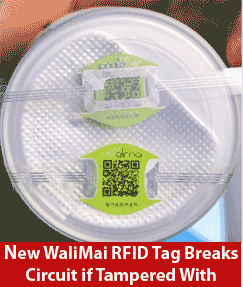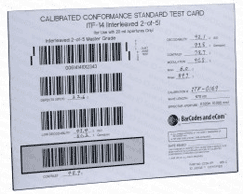Below are some of the top stories in RFID and data collection in recent weeks.
Alien Technologies and Start-Up SensThys Claim Breakthrough in Reader Array Costs
Long time RFID provider Alien Technology and and start-up SensThys have just announced a new highly networked RFID reader and antenna solution that the companies say can reduce overall RFID reader system costs by as much as 50%.
"The problem today is that RFID reader antenna don't 'see' all the tagged items in a store or facility. Adding an additional reader to solve this often breaks the ROI for companies," said Neil Mitchell, senior director of marketing at Alien.
Supply Chain Digest Says... |
 |
| The test cards from GS1 US will enablecompanies across all industries test the effectiveness of their barcode verifiers and improve verification reliability. |
 |
What do you say? |
| Click here to send us your comments |
 |
| Click here to see reader feedback |
|
|
Mitchell says Alien's new reader+antenna solution solves this problem by enabling large numbers of low-cost readers to be installed in an area to increase coverage – while minimizing cabling, installation time, programming and the overall staffing that's needed for deployment.
The new readers utilize Power over Ethernet Plus (PoE+) inputs and outputs. They can be daisy-chained into a string of collaborative or individual read points, which minimizes cabling back to the network switch and lowers installation costs. Since it is powered by PoE+, it's not necessary to run AC or DC cabling, and RF cables aren't needed due to the reader's integrated antenna.
All this allows more reader density for lower costs, improving read rates in a zone in a retail store, distribution center, or other areas.
The new product is available under two names—the Hydra (sold by Alien) and the SensArray (sold by SensThys)
China Company Releases RFID Labels to Fight Counterfeiting
When it comes to making fake goods, China is the counterfeit capital of the world. Counterfeit and knock-off products can range from cosmetic items to food products, medicines and even cars.
China-based technology company WaliMai has developed RFID-based anti-counterfeit labels that are fixed to a product to let consumers know for (almost) certain that it is genuine.
"We have a banking-like level of security. Every label has an RFID chip inside which has a certain re-writeable memory, and with every consumer scan - when the consumer uses the mobile phone to scan the label by just touching it for a second or two - the data on the chip is changing," WaliMai co-founder Alexander Busarov told Reuters.
 "With every scan the system updates itself,so it becomes nearly impossible for the counterfeiter to even theoretically make a fake and put it into the supply chain," he added. "With every scan the system updates itself,so it becomes nearly impossible for the counterfeiter to even theoretically make a fake and put it into the supply chain," he added.
Chinese officials have unearthed a series of recent food health scandals, including rice contaminated with heavy metals, the use of recycled "gutter oil" in restaurants as well as the sale of baby formula containing lethal amounts of the industrial chemical melamine in 2008.
WaliMai tags are now being affixing to imports of European brands of infant formula – a major target for counterfeiters. This allows parents able to scan the label using the WaliMai app to securely check its authenticity and where it's come from.
The company also plans to expand into areas such as wine, cosmetics and pharmaceuticals.
"The consumer comes to the shop and touch the label with their mobile phone. It takes about two seconds for the confirmation and re-writing of the codes. Then the first piece of information they get is that it's actually authentic," said Busarov.
(See More Below)
|
CATEGORY SPONSOR: SOFTEON |
|
|
| |
|
|
He added: "Then there's all the information on the logistic supply chain so they can see where the product was produced, where it was packed, where it entered the country that they're in - in our case it's China - when it was checked in our warehouse, and also they can see their own scan. Every scan that they make is also tracked by our system, so we track the locations as an additional layer of security."
Each WaliMai label is single-use; an antenna connected to the RFID chip is broken when the product - currently the lid of the baby formula - is opened. Busarov said that any counterfeiters would "basically need a lab" in order to even attempt to fix the broken label. He added that the cost to the consumer of the WaliMai label is about 20% on top of the regular price of the baby formula – which seems rather pricey to SCDigest.
New GS1 US Technology Produces Test Cards to Support Effective Barcode Verification Processes
GS1 US now offers test cards created with a new, proprietary verification machine called the 1D Judge. The test cards produced by the 1D Judge will help labeling professionals, packaging engineers, research and development, and quality assurance professionals across all industries test the effectiveness of their barcode verifiers and improve verification reliability.
Companies use test cards to challenge the effectiveness of the barcode verification machines they use to help assure that their EAN/UPC barcodes (commonly used within the supply chain and at point of sale) can be read accurately in the marketplace.
 "Improperly functioning verifiers can allow faulty barcodes to be circulated, posing a data integrity and financial risk to businesses," said Carrie Wilkie, vice president of standards management, GS1 US. "The test cards created with the 1D Judge purposefully embed imperfections designed to challenge the verifier. If a company's verifier can spot the imperfections placed in the test cards, the company knows its verifier is functioning correctly and can be confident their barcodes will perform well throughout the supply chain." "Improperly functioning verifiers can allow faulty barcodes to be circulated, posing a data integrity and financial risk to businesses," said Carrie Wilkie, vice president of standards management, GS1 US. "The test cards created with the 1D Judge purposefully embed imperfections designed to challenge the verifier. If a company's verifier can spot the imperfections placed in the test cards, the company knows its verifier is functioning correctly and can be confident their barcodes will perform well throughout the supply chain."
Barcode verifiers and test cards are used in a variety of industries including retail, CPG, and healthcare. Solution providers such as label printers also benefit from the use of test cards to verify their equipment.
The cards cost either $490 or $600, depending on the bar code symbology.
Any reaction to this week's round up stories? Let us know your thoughts at the Feedback section below.
Your Comments/Feedback
|